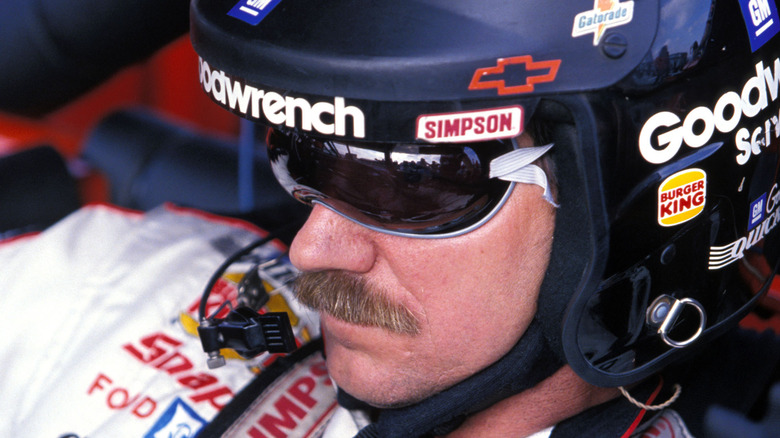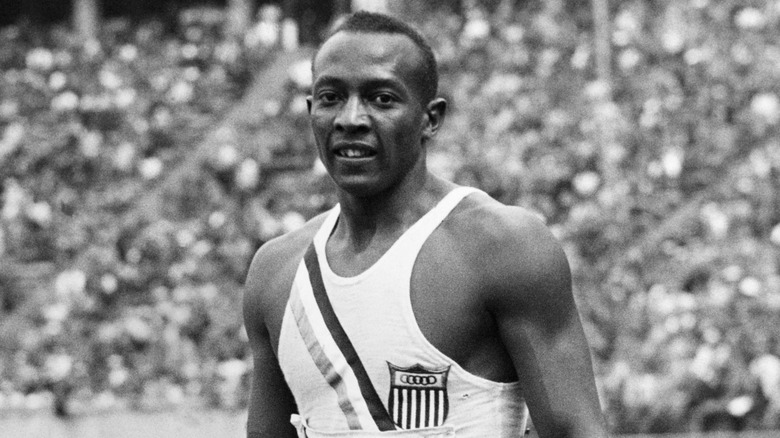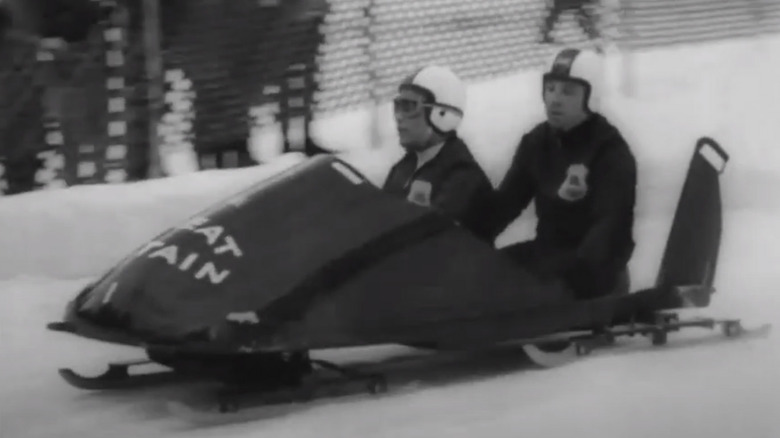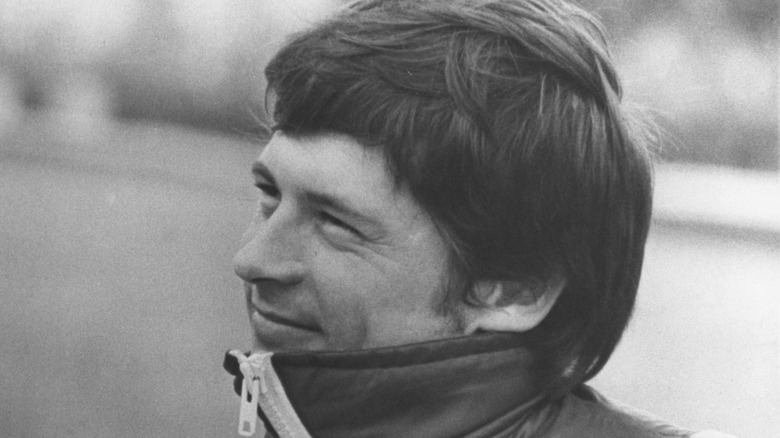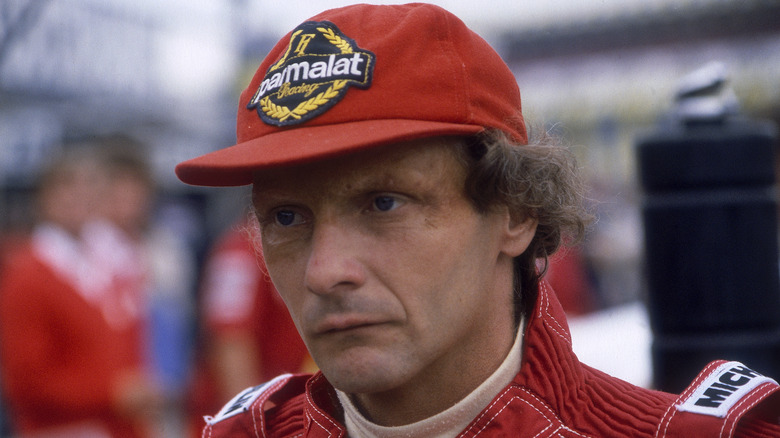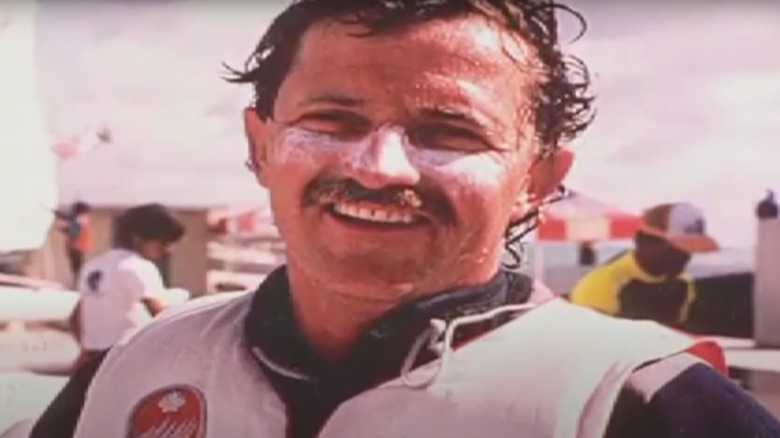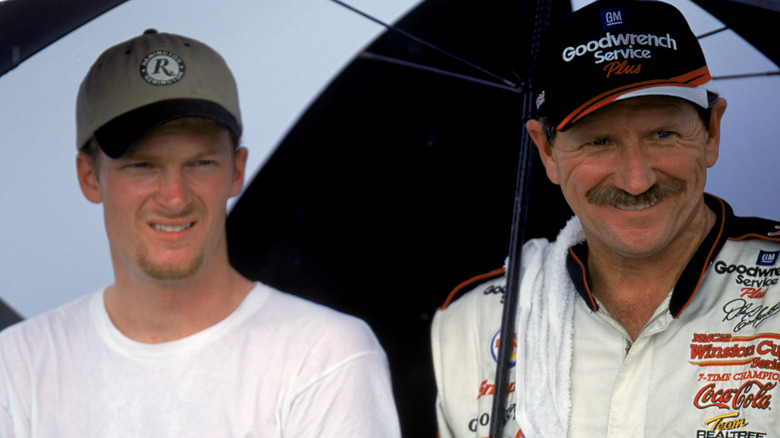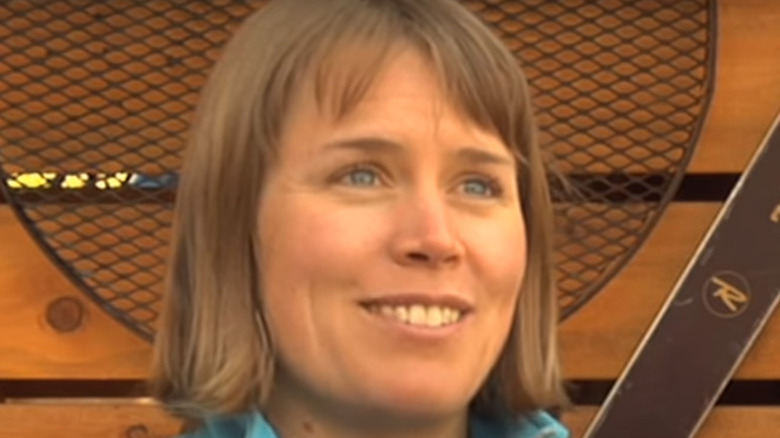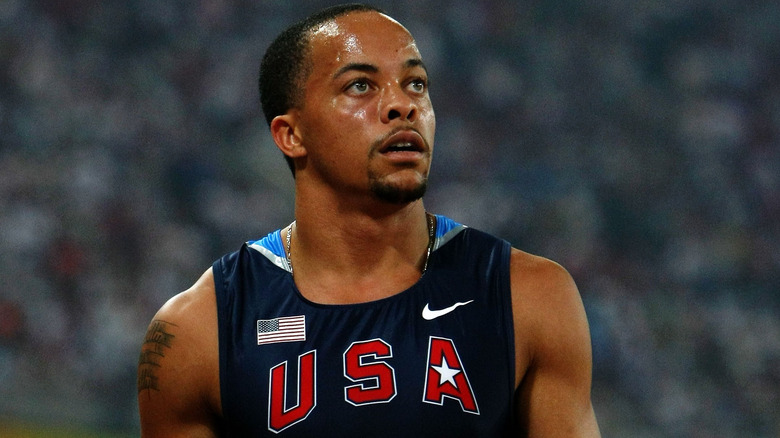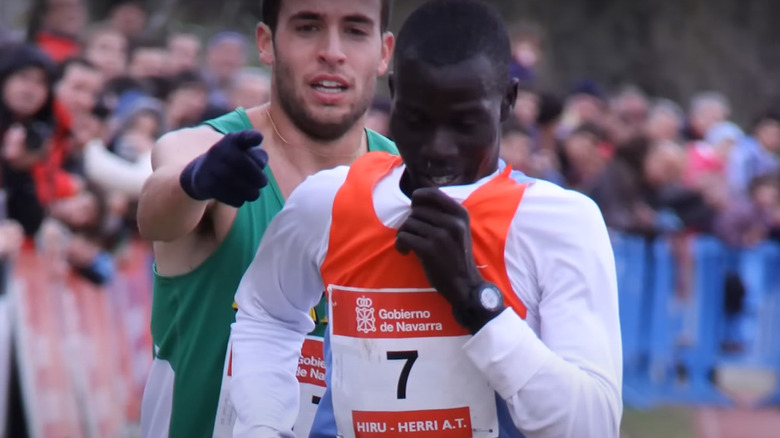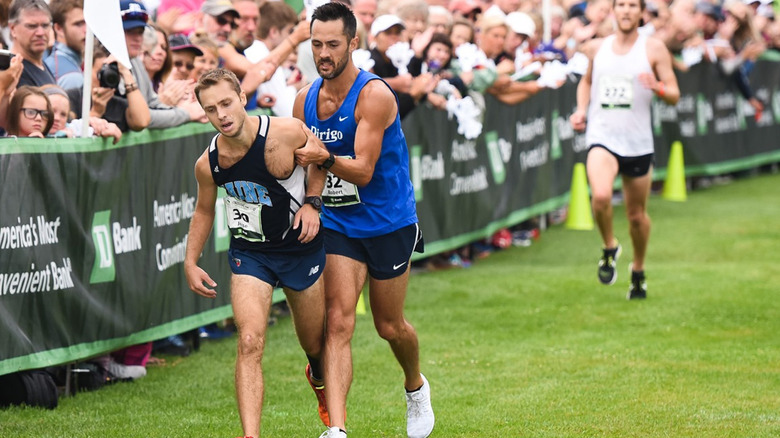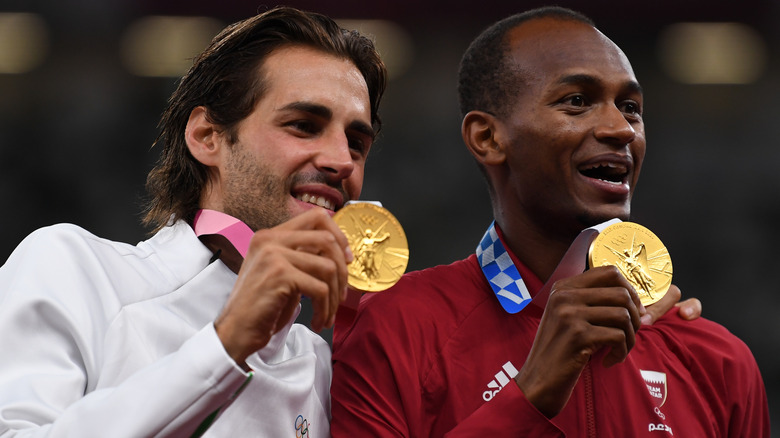Athletes Who Sacrificed Their Wins For Something Even Greater
We may receive a commission on purchases made from links.
The late NFL-coaching great Vince Lombardi once said, "Winning isn't everything, it's the only thing." Unsurprisingly, he wasn't alone in that mindset within the cutthroat sporting world, where players resort to any and everything to win. That sports serve as a metaphor for warfare hasn't been lost on bona fide battalions, such as the British Army, which long believed that top-grade athletes would demonstrate similar prowess as soldiers. Yet among civilian combatants, such conflict is seldom personal unless genuine hatred exists between opponents. When Buffalo Bills' safety Damar Hamlin suffered a cardiac arrest in an NFL match against the Cincinnati Bengals in late 2023, the scoreboard became irrelevant as attention shifted towards the well-being of the player, while referees canceled the rest of the game.
Winning might be a value, but it's not a virtue. Sometimes, situations force athletes to decide whether to keep an eye on the prize or sacrifice a victory simply because it's the right thing to do. After American Formula One driver Brett Lunger saved the life of a rival, he simply said, "It was a situation where something had gone wrong, and you react and do what you have to do," per Autoweek. Such split-second decisions may not result in gold medals, shiny trophies, or Super Bowl rings, but as the following accounts will show, top dogs may win most of the time, but those exemplifying genuine sportsmanship make for even more outstanding champions.
Jesse Owens credits his Olympic success to a German rival
The pageantry surrounding the 1936 Olympics in Berlin was horrific, with Germany's Fuhrer Adolf Hitler using the games to parade his notion of Aryan supremacy before the entire world, a circumstance that might have intimidated African-American track star Jesse Owens. It could have thrown the athlete off his game during broad jump qualifying until he ran into athlete Lutz Long, whose sculpted features and athletic abilities embodied Hitler's master race design. After the two exchanged pleasantries, Lutz said, in David Wallechinsky's "The Complete Book of the Olympics," "Something must be eating you. You should be able to qualify with your eyes closed." After Lutz advised Owens where to set his mark, the American easily qualified. Owens won four gold medals throughout the Olympics, beating Lutz each time. And after every win, Lutz was the first person to congratulate him, much to the chagrin of Hitler.
"It took a lot of courage for him to befriend me in front of Hitler," said Owens, per World War 2 History Short Stories. "You can melt down all the medals and cups I have, and they wouldn't be a plating for the twenty-four karat friendship that I felt for Lutz Long at that moment." The friendship between the two lasted for years until Long, drafted by the German army in the Second World War, died during combat in Sicily in 1943. Owens died from cancer in Tucson, Arizona, in 1980. He was 66.
Brits win bobsledding gold thanks to a donated bolt
Credit the Brits for managing to assemble an Olympic-caliber bobsledding contingent, considering their surroundings lack the elevation to facilitate a track for such a sport. But when a tandem outfit from that team does well enough to win a gold medal, as was the case in 1964 in Innsbruck, Austria, some of those kudos should be directed towards the Italians. After all, that country's bobsledding elite selflessly invited the Great Britain duo of Robin Dixon and Tony Nash to train with them in Cervinio a year earlier.
Dixon and Nash made the most of the invitation to the point where they were high-ranking competitors once they hit the Olympics. In fact, after their first run, the Brits were leading the pack. But when they noticed a bolt securing the runners to the bottom of their sled was missing, the two felt their chances at gold were dashed. Meanwhile, the Italians had placed close to the top and could have used Dixon and Nash's misfortune as an opportunity to climb higher in the ranks. Instead, Italian teammate Eugenio Monti got the Brits a spare bolt so they could continue competing. In the end, Great Britain won gold, while Italy settled for bronze. But Monti received something extra: a Pierre de Coubertain medal for his sportsmanship in helping his rivals win. "[Monti] was a wonderful man and a great friend," said Nash (via Olympics). "In fact, all the Italians were our friends."
F1 driver risks his life trying to save a colleague
Competitive sports can be extremely dangerous, as U.K. viewers discovered in 1973 while watching the Formula One Dutch Grand Prix for the first time on live television. But anticipation turned into tragedy when they saw one of their own — driver Roger Williamson — perish on the track despite racing colleague David Purley's efforts to save his life. A blown tire flipped Williamson's car into a guardrail, an incident made more treacherous when a punctured gas tank triggered a fire in the vehicle. Seconds later, Purley reached the crash site and, abandoning any chances of winning the Grand Prix, stopped his car and dashed to the crash site, where he manually tried to right the car. Failing that, Purley frantically grabbed a fire extinguisher from an arriving safety official and doused the vehicle, actions that weren't enough to save Williamson's life.
No other driver stopped to help Purley as the race continued under caution. It was later determined that Williamson died of asphyxiation and was still alive when the car crashed, adding speculation that he might have survived had rescue crews arrived sooner. "I think the race should have been stopped, and it's very difficult, of course, because we're still about a mile and a half away from the grid where the decisions are made, and all they could see was a lot of smoke going up in here," Purley said to AP at the time. "They didn't obviously realize the extent of the tragedy."
Rival drivers save a world champion's life
While defending his world championship title in 1976, Austrian Formula One driver Niki Lauda was in formidable form. But almost tragically, he met his match on Germany's intimidating Nurburgring course, a circuit that's claimed the lives of up to 70 competitors and test drivers. That year, Lauda almost added to those morbid stats when his Ferrari overshot a turn, bounced off the retaining wall, and spun out of control on the track. U.S. driver Brett Lunger collided with Lauda's burning vehicle, while three other competitors (Guy Edwards, Harald Ertl, and Arturo Merzarlo) opted against trying to win the German Grand Prix to help Lauda, pinned in the burning vehicle. Hampered by the smoke and flames, the four drivers managed to disengage Lauda's safety belt and harness to carry him to safety. Lauda suffered third-degree burns to his face and damage to his lungs but was alive.
"Niki was lucky because the pain of the flames and the gas fumes made him pass out," recalled Merzarlo to F1 Memories. "With his body relaxed, I could take his belt out in a tenth of a second." Ironically, Lauda was trying to persuade drivers to boycott the Nurburgring event on the grounds that the circuit was unsafe but was outvoted. Miraculously, he was back in his Ferrari later that season and would win two more world championships later in his career. But the 1976 near-tragedy marked the last time Formula One would ever race at Nurburgring.
Sailor rescues a survivor of a capsized boat during the Olympics
Taking some sting out of a doping scandal that stripped Canada's star athlete Ben Johnson of a gold medal at the 1988 Seoul Olympics was Larry Lemieux, a sailor from the country's landlocked province of Alberta, who did something extraordinary at the Games. Lemieux was racing his sailboat in an event that saw him in front until a miscalculation robbed him of his lead. Trying to regain first place, Lemieux spotted a Singapore craft competing in a separate event, struggling in the merciless waves. Realizing the boat and one of its occupants, Joe Chan, was in trouble, Lemieux quickly withdrew from the race and went into rescue mode. "I had to make the decision: Do I keep going or go get them?" he said a year later before being inducted into the Alberta Sports Hall of Fame and Museum. "So I decided to go get them." Lemieux fished Chan from the surf while Chan's partner clung to the side of Lemieux's craft.
Lemieux finished 11th overall in the event's seven-race series, although he was recognized for his sportsmanship with the Pierre de Coubertain medal. But Lemieux seemed to find humor in what could have been a tragedy. "I was just thinking how ironic it was. You spend your whole life training and working, and you know, winning championships and doing things, and nobody cares. And for something that I believe anyone would have done under the same circumstances, you get all this."
Dale Earnhardt dies protecting his son at Daytona
For more than two decades, NASCAR's Dale Earnhardt earned his racing stripes as "The Intimidator" for his aggressive approach on the track. But on February 18, 2001, the 7-time series champion employed those same talents to defend his son, Dale Earnhardt Jr., via a benevolent action that would cost him his life. That day, Earnhardt was competing in NASCAR's flagship Daytona 500 and, with a couple of laps remaining, had pushed himself through heavy traffic to grab third place, trailing his son and Michael Waltrip, Dale Jr.'s teammate. Rather than overtake the two, the 49-year-old stayed behind to protect their track positions. But in the final turn of the race, a bump between Earnhardt and Sterling Marlin sent the legend into the wall. For Waltrip and Earnhardt Jr., who finished first and second, respectively, the results were bittersweet once they learned that Dale Sr. died instantly in the crash.
Fans across the country mourned the loss on what was one of NASCAR's darkest days, but nobody took the tragedy harder than Dale Earnhardt Jr. "Having dad was like a cheat sheet," Earnhardt Jr. told ESPN. "Having dad was like knowing all the answers to everything. And I was like, man, I'm going to have to do this without that the rest of my life." After coming to terms with his loss, Earnhardt Jr. did very well for himself, winning 27 races, including two Daytona 500 titles, before he retired in 2017.
Donated ski pole costs Norway a podium finish
When nations competing in the Olympics pit their best athletes against the rest of the world, such pressure is bound to create a few feuds. However, within each sport, a special camaraderie among athletes sometimes trumps patriotism, which was on full display during a women's cross-country skiing event at the 2006 Winter Games in Turin, Italy. During a team relay competition, the Canadians were leading until teammate Sara Renner broke a ski pole, jeopardizing hopes of a win. "That was strange," Renner recalled to National Post. "I had never broken a ski pole before. Or since." But thanks to Bjornar Haakensmoen, Norway's head coach, who quickly handed Renner a spare pole, the Canadians finished second for a silver medal. Norway unfortunately ended up fourth, missing the podium.
Haakensmoen didn't mince any words about his actions, which cost Norway a medal. "This competition, and all competition, it should be a fight," he told ESPN. "It should not be decided by the skis." If anything, it was retribution for Norway ignoring a Swedish competitor in a similar plight as Renner's some years earlier. A grateful Renner gave the coach a bottle of Barolo wine for his generosity. Two months later, Haakensmoen received an even bigger surprise in the form of five tons of maple syrup donated by Canadian fans. "It's sweet and a little unusual," said Haakensmoen, per CBC. "We might have it from time to time, but not five times a day."
Athlete sends his medal back to disqualified runner
Some victories are easier to swallow than others. A win based solely on ability is worth celebrating, although success based on technicality isn't so easily embraced. That's what faced U.S. sprinter Shawn Crawford, who fell short of a medal by finishing fourth in the men's 200-meter dash at the 2008 Beijing Olympics. But fate intervened when officials disqualified second- and third-place finishers Churandy Martina and Wallace Spearmon for stepping out of their lanes during the race, won by Jamaica's Usain Bolt. As a result, Shawn Crawford found a silver medal, which he could have kept for bragging rights. Instead, while at a track meet in Switzerland a year later, Crawford placed the medal in a box, which he left for Martina at a hotel where he was staying. He added a note that read: "You ran a silver-medal race and deserve this medal."
It was Crawford's way of righting what he felt was an injustice to his Netherland Antilles opponent, who had previously failed to overturn the ruling in an appeal. "I'm like, if a guy is 10 meters in front of me, I don't care if he stayed in the middle of his lane," Crawford told the Associated Press. "He was going to beat me anyway. He didn't impede in anybody's race." In 2013, Crawford became front-page news again after U.S. officials banned the athlete from competition for two years after failing to comply with dope-testing requests.
Kenyan runner wins after a competitor shows him the way
Despite losing a cross-country race in 2012 in his native Spain, long-distance runner Iván Fernández Anaya became a national hero and a global sensation. More succinctly, it was the defeat that earned him that distinction. But it was what Anaya did to earn that notoriety that made its way onto sports pages around the world. The incident started near the tail end of a race held in Burlada, in Spain's northern region of Navarre, with first place belonging to Kenya's Abel Mutai, who months earlier won bronze in the 3,000-meter steeplechase at London's 2012 Summer Games. Anaya trailed Mutai, who was moments away from victory. Suddenly, Mutai slowed down after thinking he had won, unaware that the finish line was still a few yards away.
Anaya easily could have zipped past the confused Kenyan to win the competition, but instead caught his rival's attention, then gestured at him, pointing out the location of the finish line. The two men jogged to the finish, with Anaya trailing Mutai by a few feet. After the race, Anaya denied he squandered a chance to take the top spot. "I didn't deserve to win it," Anayato said to El Paiz. "I did what I had to do. He was the rightful winner. He created a gap that I couldn't have closed if he hadn't made a mistake. As soon as I saw he was stopping, I knew I wasn't going to pass him."
Collapsed runner gets a win thanks to rival
With a $1,000 cash prize up for grabs in Maine's 2017 staging of the 10K Beach to Beacon long-distance running competition, the smart money among male athletes seemed to be on contender Jesse Orach. For the previous four years, the University of Maine student garnered impressive numbers, with several first-place and podium finishes in everything from cross-country to indoor and outdoor track competitions. To top it off, Orach was also the Beach to Beacon event's defending champion. And for much of the race, Orach was true to his stats, galloping in front of the pack. But with roughly 100 yards left to go, Orach collapsed when his weakened legs couldn't take much more. Enter cross-country veteran Rob Lopez, who was about to pass a worn-out Orach for the win when he did something extraordinary.
For that crucial final leg, Lopez helped Orach get up and carried him to the finish line. Once Orach crossed the line first, Lopez let go of his opponent, who plopped to the ground like a rag doll. After the race, Lopez made no bones about his decision to forego a championship opportunity in favor of assisting a competitor. "In the running community, I feel camaraderie comes before competitiveness," Lopez told ABC News. "I think it should always be like that. And Jesse's a great runner and even better guy." A grateful Orach said to the Portland Press Herald, "I'm speechless with what he did."
Olympic high jumpers opt to share gold
Sports fans seeking scandal at the 2021 Tokyo Olympics weren't disappointed over the deluge of doping, sexual misconduct, and social media war incidents spilling out of the five-ring circus. Purists may have felt deprived over their quest for events exemplifying the fair-play aspect of the Olympics, but fortunately, they had something to cheer about when the high jump finals hit the stadium. After each round, the raising of the bar gradually whittled down the field until only two competitors — Qatar's Mutaz Essa Barshim and Italy's Gianmarco Tamberi — remained. They each cleared 7 feet 9 1/4 inches, but when the bar was raised a tiny fraction more during the jump-off, neither made that jump after three tries.
Olympic footage told the rest of the story. "We can continue with the jump-off," said an official to the competitors. "Can we have two golds?" asked Barshim. Responded the official, "It's possible, depends if you decide," at which point, the two athletes made their unanimous response known by excitedly hugging each other, with Barshim telling Tamberi, "History, my friend. Olympic champions!" Almost on cue, the stadium crowd roared its approval. The decision was hardly a compromise but a crowning moment between the two athletes who have been best buds for years. "We've shared a lot in our careers and private lives," said Tamberi after the two received their medals. "Sharing the gold medal with [Barshim] was our dream, and for me, it's an honor and a huge pleasure."

